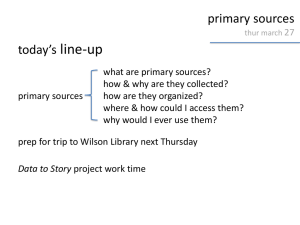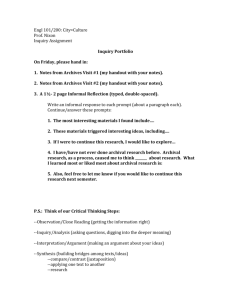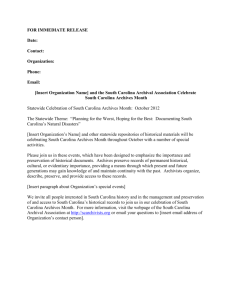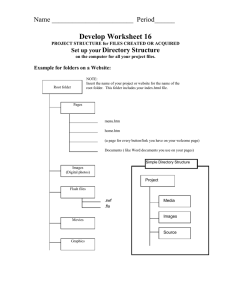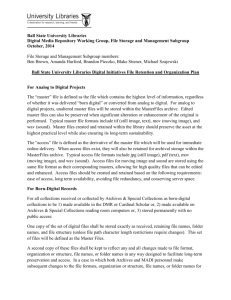The Portable Editor
advertisement
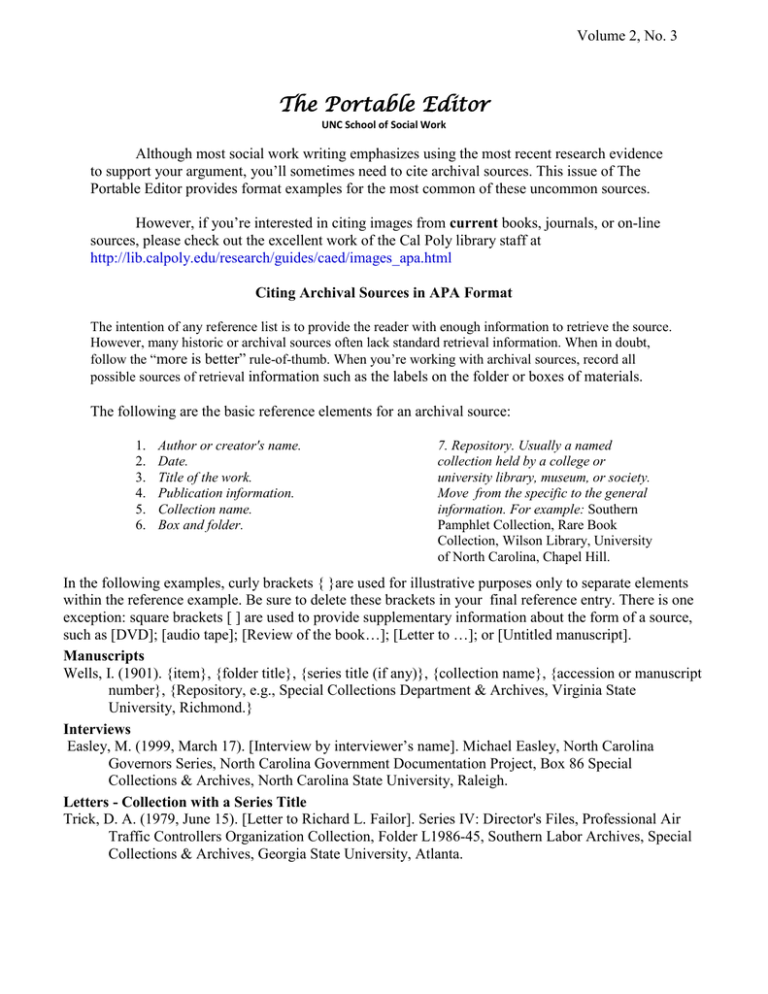
Volume 2, No. 3
The Portable Editor
UNC School of Social Work
Although most social work writing emphasizes using the most recent research evidence
to support your argument, you’ll sometimes need to cite archival sources. This issue of The
Portable Editor provides format examples for the most common of these uncommon sources.
However, if you’re interested in citing images from current books, journals, or on-line
sources, please check out the excellent work of the Cal Poly library staff at
http://lib.calpoly.edu/research/guides/caed/images_apa.html
Citing Archival Sources in APA Format
The intention of any reference list is to provide the reader with enough information to retrieve the source.
However, many historic or archival sources often lack standard retrieval information. When in doubt,
follow the “more is better” rule-of-thumb. When you’re working with archival sources, record all
possible sources of retrieval information such as the labels on the folder or boxes of materials.
The following are the basic reference elements for an archival source:
1.
2.
3.
4.
5.
6.
Author or creator's name.
Date.
Title of the work.
Publication information.
Collection name.
Box and folder.
7. Repository. Usually a named
collection held by a college or
university library, museum, or society.
Move from the specific to the general
information. For example: Southern
Pamphlet Collection, Rare Book
Collection, Wilson Library, University
of North Carolina, Chapel Hill.
In the following examples, curly brackets { }are used for illustrative purposes only to separate elements
within the reference example. Be sure to delete these brackets in your final reference entry. There is one
exception: square brackets [ ] are used to provide supplementary information about the form of a source,
such as [DVD]; [audio tape]; [Review of the book…]; [Letter to …]; or [Untitled manuscript].
Manuscripts
Wells, I. (1901). {item}, {folder title}, {series title (if any)}, {collection name}, {accession or manuscript
number}, {Repository, e.g., Special Collections Department & Archives, Virginia State
University, Richmond.}
Interviews
Easley, M. (1999, March 17). [Interview by interviewer’s name]. Michael Easley, North Carolina
Governors Series, North Carolina Government Documentation Project, Box 86 Special
Collections & Archives, North Carolina State University, Raleigh.
Letters - Collection with a Series Title
Trick, D. A. (1979, June 15). [Letter to Richard L. Failor]. Series IV: Director's Files, Professional Air
Traffic Controllers Organization Collection, Folder L1986-45, Southern Labor Archives, Special
Collections & Archives, Georgia State University, Atlanta.
Volume 2, No. 3
Letters - Collection without a Series Title
Wells, I. B. (1899, May 3). [Letter to Frederick Douglas]. Ida Barnett Wells Papers. Box 76, Folder L1899-1902.
Southern Racial Justice Project - Special Collection, Southern Baptist Historical Society Library &
Archives, Southern Baptist Convention, Nashville, TN.
Photographs
Photograph of Robert M. Yerkes. (ca. 1917-1920). Robert Mearns Yerkes Papers (Box 137, Folder 2292),
Manuscripts and Archives, Yale University Library, New Haven, CT.
Note: APA 6th edition allows use of ca. (circa) to indicate estimated dates of archival sources; use question marks to indicate
uncertainty related to names, locations, and dates.
Microfilm & Microfiche Records
Newspaper article on microfilm
Author. (Year, Month Day). {Article title.} {Name of Newspaper, Section Page.} {Reel #, Microfilm Collection,}
{Repository, e.g., Michigan Pioneer and Historical Society, Lansing, MI.}
Federal & State Census on microfiche
{Name of Census area, e.g., Portage Township, Houghton County, MI.} {(Census year e.g.,1890).} Federal Census.
{Collection name, e.g., Microfiche Collection,} {Repository, e.g., Copper Country Historical Collections,
Upper Peninsula Technological University, Hougton, MI.}
Article in a collection
Sutherland, R. N. (1879, June 5). Organize society to save youth. [Editorial]. Eastern Carolinas Husbandry, p. 2. In
Grange Notes for Progressive and Successful Community Life, 36 (1942) [Microfilm]. (Reel 1, Microfilm
250). Special Collections, Virginia Union University, Richmond.
Clippings
Clipping collections often lack citation information. For example, clippings might be undated or lack a source
notation. Use the available information to follow the traditional author–date format to the greatest extent possible,
and provide other information that will help the reader retrieve your source, such as document identification
numbers, box numbers, folder designations.
Undated newspaper clipping from a clipping file, no author cited:
Origin of the Ku Klux. (n.d.). The New York Sun. Folder C363 K 95, 1-2. Southern Heritage Clipping Collection,
Wilson Library, University of North Carolina, Chapel Hill.
In-text citation: (“Origin,” n.d.)
Frederick Douglas to speak. (n.d.) Clippings Miscellaneous Scrapbook Series: Box 36-1876-1878. Document
SB031081b. Southern Heritage Clippings Collection, Wilson Library, University of North Carolina,
Chapel Hill.
In-text citation (“Frederick Douglas,” n.d.)
Dated clipping with author, unknown source:
Rowland, H. (1878, September 7). Note on the theory of racial equality. [Unknown newspaper]. Catalog 1031,
Southern Heritage Clippings Collection, Wilson Library, University of North Carolina, Chapel Hill.
In-text citation (Rowland, 1878)
Pamphlets or Flyers:
Lynching in all its phases. (1893). [Flyer announcing a public lecture by Ida B. Wells]. Southern Pamphlet
Collection, Rare Book Collection, Wilson Library, University of North Carolina, Chapel Hill.
In-text citation: (“Lynching,” 1893)
